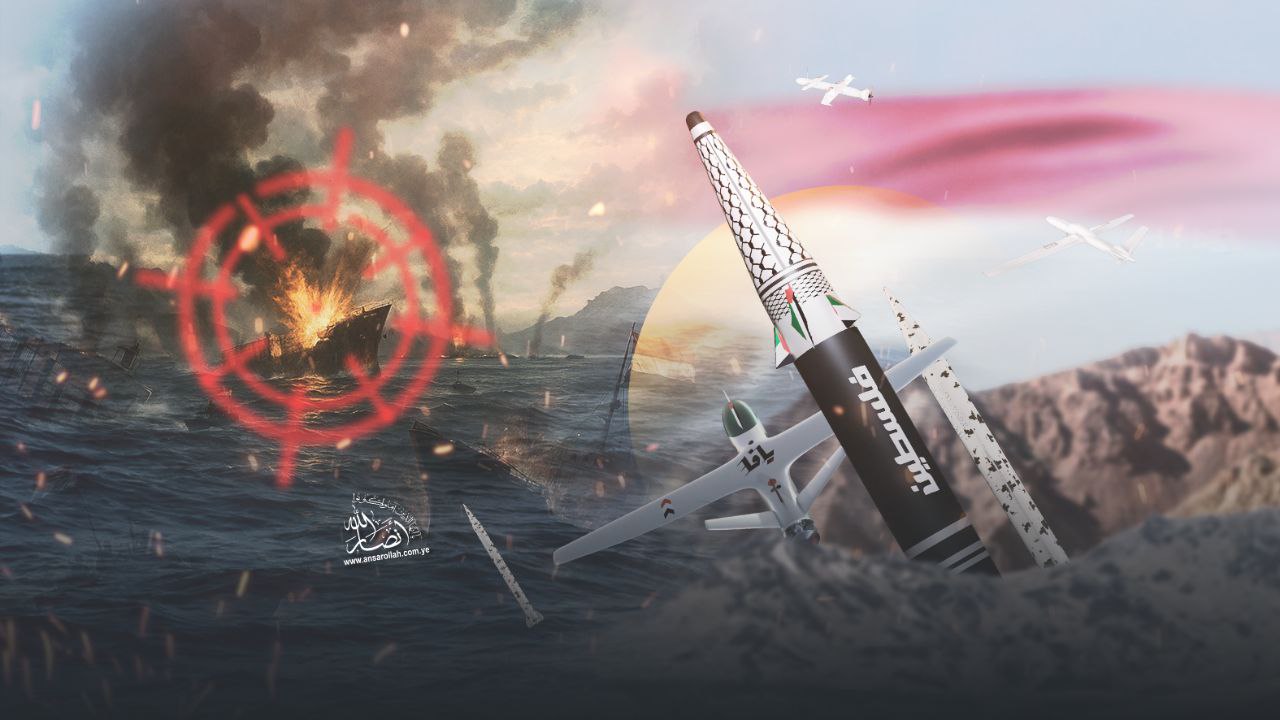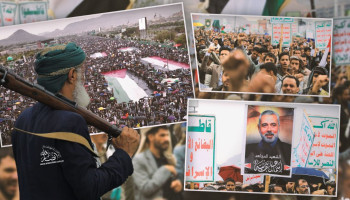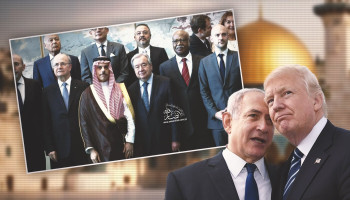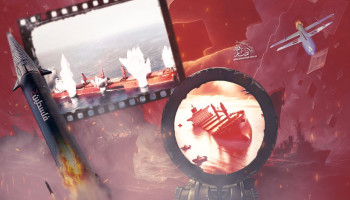Ansarollah Website Official Report
Published: Safar 9, 1447 AH
In an era where many have abandoned just causes, the Yemeni people have stood tall as a beacon of light against darkness and deception. They have embodied loyalty and pride in their most profound forms, rallying in more than 1,319 public squares to raise the flag of Gaza and chant its name, unshaken by relentless rain, cold, or the grinding poverty that has plagued them for years.
In an extraordinary moment, rain poured upon the gathered masses as if the heavens themselves were joining in their act of devotion. Not a single person retreated. They held their ground, renewed their vows to Gaza, and continued chanting with unwavering spirit. It was a scene reminiscent of myth, yet real in every detail. Anyone who stands in the rain chanting for Palestine cannot be defeated, no matter how fierce the hardship.
The rain seemed another test of the legendary patience of the Yemeni people, but rather than faltering, they drew strength from the downpour, as if every drop cleansed their stance and elevated their cause. Elderly and children, the wounded and the disabled, stood shoulder to shoulder beneath the open sky, declaring that Palestine lives in their hearts and that Gaza is not alone.
Words failed to describe the sheer power of those scenes. The squares overflowed with resolve, trembling with sincere chants: “Our blood is with Gaza, our souls for al-Quds.” These were no fleeting demonstrations — they were a declaration of humanity and a message to the world that Yemen, despite siege and wounds, remains at the forefront of the Ummah, guarding its dignity and scripting a new epic of honor in pain and blood.
Yemen’s support for Gaza is not new, but it never ceases to astonish in its depth and grandeur. While under siege, Yemen could have turned inward. Instead, it chose to stand with Gaza, proving that those who carry Palestine in their hearts cannot have their will broken. This is the Yemeni spirit: mighty in endurance, mighty in loyalty, and mighty in stands that will remain etched in the memory of the nation.
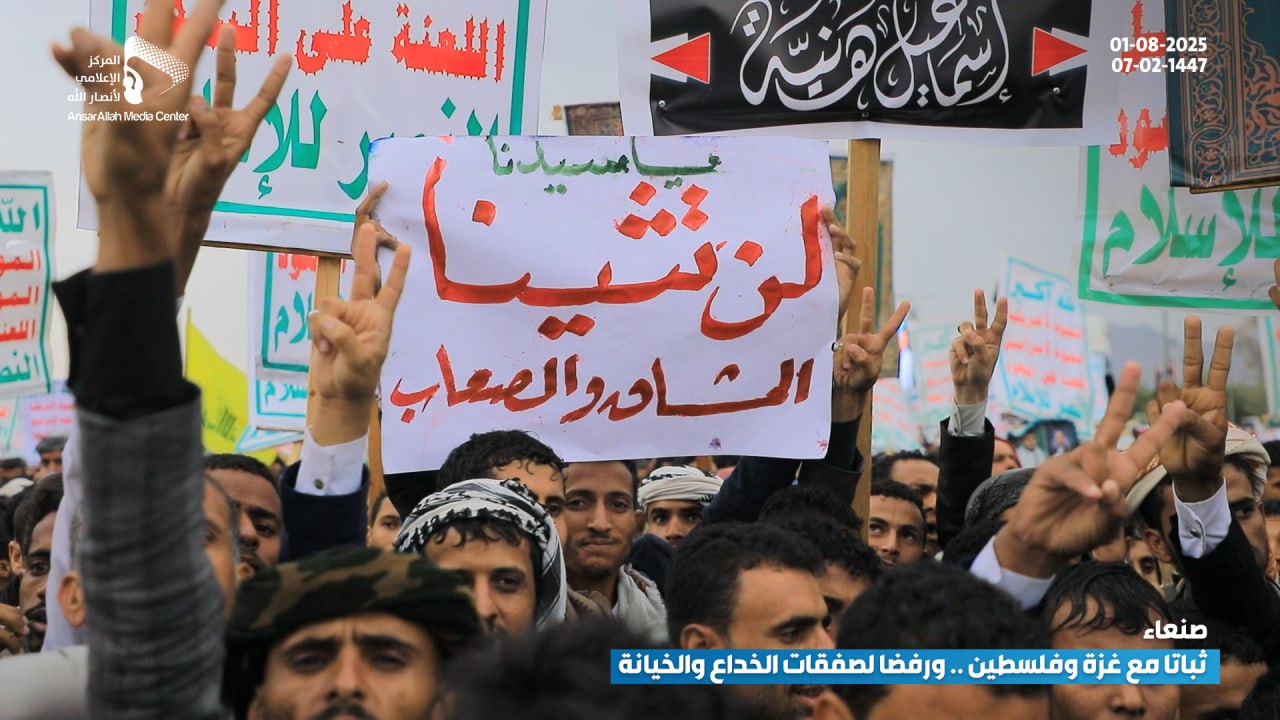
Dignity Begins in Yemen
The resounding voice of the Yemeni crowds sent a clear message to the world: “We are not weak. We are people of a cause. And if others fail to support Gaza, Yemen will carry on.” These are not spontaneous emotions but deeply rooted positions in a long history of support for Palestine, with money, fighters, political, media, and military efforts.
Though Yemen is burdened by a suffocating blockade, dire humanitarian crises, and economic collapse, it has not forgotten Gaza. It has, instead, marched to the forefront. For Yemen, Palestine is the cause of the entire Ummah, and resistance against occupation is an honor that cannot be compromised. Yemenis have proven they do not need luxury or foreign backing to express their conscience — all they need is a cause they believe in. And in Palestine, they have found just that.
Popular and Military Support
In a move that restored dignity to the Arab world and disrupted the strategies of global powers, Yemen entered the war on Gaza’s side — not with slogans alone, but with missiles, drones, and naval operations that shattered Israel’s defenses and placed the United States in an unprecedented defensive stance.
Despite years of crippling siege, Yemen transformed into a formidable military power that instills fear in the Zionist entity and confounds America, redrawing the map of deterrence in the region.
In a stunning escalation, Yemen’s Armed Forces announced in November 2023 the launch of direct missile strikes at Zionist military targets in Umm ar-Rashrash (Eilat) and surrounding areas — strikes that Tel Aviv repeatedly confirmed. The attacks forced the Zionist enemy to bolster its Iron Dome in the south. Zionist Chief of Staff Herzi Halevi admitted in a December interview on the Zionist’s “Kan” channel: “We were not prepared for the attacks from Yemen. They pose an unprecedented strategic threat.”
In parallel with the missile strikes, Yemen imposed a naval blockade on the Zionist entity, forcing the closure of the port of Umm ar-Rashrash. Recently, the Yemeni Armed Forces escalated their maritime siege, announcing sanctions on any company that deals with the occupied Palestinian ports. These sanctions include targeting any ship affiliated with violating companies.
Just yesterday, the Humanitarian Affairs Coordination Center — tasked with liaising with violating companies — issued a final warning, stressing that any firm ignoring Yemen’s decision will face sanctions. As a result, major shipping routes have changed, and companies have begun avoiding the occupied ports. Yemen’s message is clear: “No ship tied to the Israeli enemy will pass while Gaza remains under siege and assault.”
Even with the direct military protection declared by the U.S. — including aircraft carriers and advanced naval fleets — Yemeni operations have not ceased. On the contrary, they’ve advanced. The United States has even been forced to withdraw its destroyers and aircraft carriers from the Red Sea for the first time in decades.
American military expert Michael Hanna previously told CNN: “Yemen — under siege for years — has now become a thorn in America’s side. It’s a stunning model of deterrence built from within a blockade.”
Yemen has shifted from a defensive stance to one of initiative and offense, placing the Zionist entity in its crosshairs and forcing the U.S. to tread carefully. This bold transformation confirms that Yemen’s strategy is no longer reactive but a comprehensive liberation plan rooted in religious and moral duty to Gaza and Palestine.
With a remarkable military performance, the world’s perception of Yemen has shifted. It is no longer merely seen as a war-torn country, but as a hardened model of resistance. International media have begun to frame the Yemeni experience as a new school in asymmetric warfare. The Guardian published a special report noting that “Yemen has flipped the balance of power in the Red Sea, imposing a new deterrence equation that forced Israel to recognize it as a strategic threat.”
.jpg)
What Washington Couldn’t Do, Traitors Won’t Achieve
After the U.S. was forced to reach an understanding with Yemen — promising not to target Yemeni ships in exchange for halting attacks on American vessels — the Zionist entity found itself exposed to Yemeni fire. It repeatedly tried to drag the U.S. back into Yemen’s conflict, but failed.
Left on its own, the entity launched drone strikes against Yemen, only to realize it was futile. The effectiveness of Yemen’s air defenses disrupted even the advanced F-35s. Yemeni President Mahdi Al-Mashat vowed to make the Zionist enemy’s most modern jets a global laughingstock.
In response, the Zionist enemy reactivated the mercenaries it had supported throughout the American-Saudi aggression on Yemen. These collaborators are now attempting to incite unrest and destabilize the Yemeni front. But Yemen remains stronger than all storms.
Sayyed Abdul-Malik Badruddeen al-Houthi, in his Thursday speech, confirmed high military readiness and issued a stern warning to anyone who sides with the Israeli enemy — traitors, saboteurs, and criminals alike. He assured that the people’s stance would be firm and that collaborators should understand the magnitude of Yemen’s unity, resilience, and national awareness.
The Zionist entity’s reliance on tools that failed for over ten years underscores the confusion and desperation it now faces, like a drowning man clutching at straws.
.jpg)
Yemen: From Blockade to Victory
What Yemen has done since the outbreak of the Gaza war is not mere solidarity — it is active participation. From a land bombarded by missiles for ten years, an indomitable force has risen, launching rockets, closing seas, and defying the most powerful armies.
Yemen did not raise arms for Gaza alone, but for the dignity of the entire Ummah. It has proven that those who possess faith, a Qur'anic vision, and divine leadership can overturn all equations, regardless of the cost.
Yemen is unconquerable.

